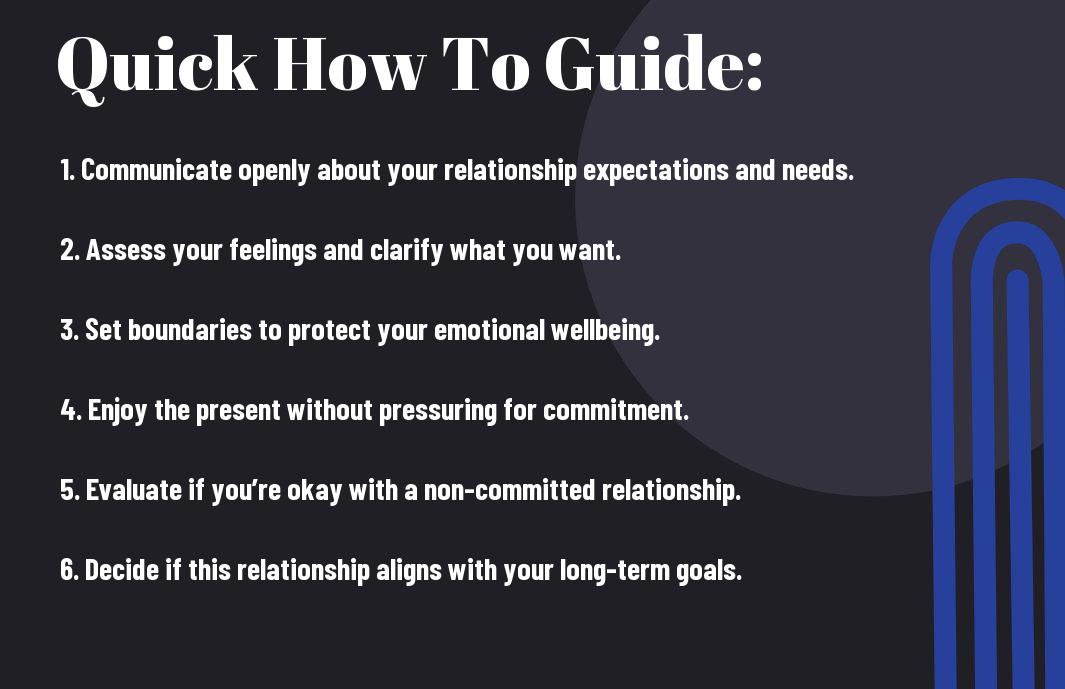Relationships can often lead to confusion, especially when you’re dating someone who isn’t ready to take the next step. It’s important to navigate this situation with clarity and intentionality. You may find yourself wondering how to balance your feelings with the reality of your partner’s reluctance. In this post, you’ll discover practical strategies to cope with this dynamic, ensure your emotional well-being, and decide what is best for your future while maintaining a healthy perspective on love and commitment.

Understanding Commitment
Before exploring your own relationship dynamics, it’s necessary to grasp what commitment truly means. Commitment in a romantic context often involves a deep emotional investment, where both partners agree to be loyal and supportive as they navigate their journey together. Understanding this concept will help you identify if you’re on the same page as your partner, which is vital for a healthy relationship.
Defining Commitment in Relationships
Now, commitment in relationships typically refers to a promise or obligation to remain dedicated to your partner. It encompasses emotional support, trust, and a shared vision for the future. When both parties openly communicate their desires, it lays a foundation for a lasting partnership.
Factors Contributing to Commitment Issues
Clearly, several factors can lead to commitment challenges in a relationship. These may include:
- Past traumas or heartbreaks
- Fear of losing personal freedom
- Unclear personal goals and aspirations
- Differences in relationship expectations
Any of these factors can create hesitance toward commitment, making it vital to understand your partner’s perspective.
It’s also important to recognize that commitment issues can stem from external influences or personal conflicts. Addressing these factors may require both partners to examine into their feelings and experiences. Consider the following:
- Insecurity regarding self-worth
- Societal pressures and family expectations
- The impact of previous relationships
- Life changes such as career shifts or relocations
Any significant life event may affect your partner’s willingness to commit, making open dialogue key to navigating these concerns.

Identifying Signs of a Non-Committed Partner
Some partners may exhibit behaviors that indicate they are not ready for commitment. Look for hesitance to define the relationship or avoid discussions about the future. If you’re questioning whether to stick around, check out this insightful article on Should You Wait for a Partner Who Isn’t Ready for a … for guidance.
Behavioral Indicators to Watch For
Signs that your partner may be avoiding commitment include consistent excuses about priorities, as well as a lack of emotional availability. If they frequently put off plans or distance themselves when discussions about exclusivity arise, this can indicate an unwillingness to invest in a serious relationship.
Communication Patterns that Reveal Fear of Commitment
Watch for communication that tends to stray away from future-oriented topics. If your partner deflects questions about where you’re heading or avoids talking about feelings, it may suggest a fear of commitment. These patterns can create confusion and highlight their reluctance to engage deeply.
Plus, frequent shifts in topics when discussing relationships may indicate they are uncomfortable with commitment. If they often sidestep emotionally intimate conversations or express vague intentions about the future, you may be dealing with someone who prefers to keep things casual. Recognizing these patterns can help you make informed decisions about your relationship.
How to Approach the Conversation
For a meaningful relationship, it’s vital to discuss your needs and desires openly. Choose a time when both of you are relaxed and not rushed, allowing for an in-depth conversation about commitment. Be clear about your feelings and the importance of this topic, while also giving your partner the chance to express their thoughts without feeling pressured.
Tips for Discussing Commitment
Approach the conversation with empathy and patience. Consider these tips:
- Be honest about your feelings.
- Ask open-ended questions.
- Listen actively without judgment.
- Stay calm and composed.
- Focus on understanding rather than convincing.
Any effort you make to communicate can strengthen your relationship.
Creating a Safe Space for Open Dialogue
Creating a safe space involves fostering an environment where both of you feel comfortable sharing your emotions and thoughts without fear of judgment. This means being attentive to your partner’s feelings and ensuring that the conversation remains respectful. Establishing mutual ground rules for the discussion can further enhance this safe space, allowing you to explore the topic of commitment openly.
With a safe environment, both partners can express their fears and expectations freely, leading to a more productive and honest conversation. This openness can lead to a deeper understanding of each other’s views on commitment, allowing for constructive dialogue. By prioritizing emotional safety, you can discover common ground and build a stronger foundation for your relationship.
Setting Boundaries
Now, it’s time to take control of your emotional safety when dating someone who isn’t ready for commitment. Setting boundaries helps protect your feelings and establish a healthier dynamic. They ensure that you understand your limits and help the other person respect those limits, paving the way for more open and honest communication.
Why Boundaries are Essential
Boundaries create a framework for your relationship, allowing you to express your needs and expectations clearly. They define what is acceptable for you and help avoid misunderstandings that can lead to hurt feelings. Without boundaries, you risk compromising your emotional well-being and may find yourself in situations that don’t serve your best interests.
Tips to Establish and Communicate Boundaries
Boundaries are vital for maintaining a healthy relationship, especially when you are involved with someone not looking for commitment. Here are some tips to establish and communicate your boundaries effectively:
- Identify your personal limits and values.
- Discuss your boundaries openly when you’re both calm.
- Be clear about your expectations and consequences if boundaries are crossed.
- Check in regularly to ensure mutual understanding.
Knowing how to communicate your boundaries will empower you to create a relationship that feels right for you.
This approach not only fosters respect but also opens the door for deeper conversations about your needs. When communicating your boundaries, consider these strategies:
- Express your feelings using “I” statements to avoid sounding accusatory.
- Remain calm and assertive, even if the conversation becomes difficult.
- Reiterate your boundaries as needed and be consistent in their application.
- Be open to feedback and willing to negotiate as your relationship evolves.
Knowing how you establish boundaries reinforces your commitment to yourself and sets the stage for healthier relationships.
Assessing Your Own Needs
To effectively navigate a relationship with someone who isn’t ready for commitment, it’s crucial to assess your own needs first. Take time to reflect on what you truly desire from a relationship and how your feelings align with your partner’s current mindset. Understanding your emotional and relational needs will empower you to make informed decisions about your involvement and help you communicate effectively with your partner.
Understanding Your Relationship Goals
For meaningful connections, it’s important to clarify your relationship goals. Ask yourself what you ultimately want out of this relationship. Are you seeking a long-term partnership, or are you open to a more casual arrangement? Establishing your goals will give you clarity and direction in your dating journey.
Aligning Personal Values with Relationship Expectations
Now, aligning your personal values with your relationship expectations is key to avoiding potential conflicts. Take stock of what values are non-negotiable for you—be it trust, communication, or mutual respect—then determine if your partner shares similar principles. This alignment will help you gauge whether you can adapt to each other’s differing wants and needs.
Relationship value alignment helps you understand where you stand with your partner. When your personal values resonate with your relationship expectations, you can foster a productive dialogue about commitment. If your core principles differ significantly, it might be an indicator that your needs won’t be met. Thus, being clear about these values can steer you toward a healthier relationship path or prompt you to reconsider your involvement.
Managing Emotions
Once again, navigating a relationship with someone who isn’t ready for commitment can put your emotional endurance to the test. It’s necessary to acknowledge your feelings and find constructive ways to cope with the uncertainty and fluctuations that arise. By understanding your emotional responses, you can work towards gaining clarity and maintaining balance without allowing the situation to dictate your mental well-being.
Coping Strategies for Frustration and Anxiety
For effective coping, consider integrating relaxation techniques into your daily routine. Whether it’s through mindfulness practices, physical exercise, or artistic expression, these strategies can help to alleviate feelings of frustration and anxiety.
Tips for Maintaining a Healthy Mindset
Anxiety can often cloud your perspective. Focusing on the following strategies can help you stay grounded and positive:
- Set personal boundaries to protect your emotional space.
- Engage in activities that bring you joy and fulfillment.
- Surround yourself with supportive friends and loved ones.
Perceiving your situation as a part of a larger journey can help foster resilience, allowing you to process your emotions in a more constructive manner.
Tips for maintaining a healthy mindset include reflecting on your wants and needs during this period. To focus your energy positively, consider these actions:
- Practice gratitude by noting aspects of your life you appreciate.
- Challenge negative thoughts by reframing them into positive assertions.
- Invest time in self-development through reading and new experiences.
Perceiving each moment as an opportunity for growth will enhance your overall emotional strength and help you manage the complexities of your relationship with optimism.
To wrap up
Following this, it’s important to prioritize your emotional well-being when dating someone who’s not ready for commitment. Be clear about your own expectations and boundaries, and communicate openly with your partner about how you feel. Assess whether the relationship aligns with your values and long-term goals. If you find that your desires for a deeper commitment are not being met, it may be wise to reconsider the relationship. In the end, you deserve a partnership that aligns with your vision for the future.










